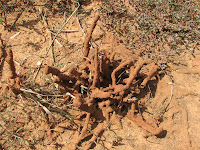It's spider season!!!
Actually, its been spider season for some time now, but it's on our minds with Halloween approaching. In truth, this time of year, my brown recluse calls go up, especially in schools. My theory is that we love to decorate and our nice Halloween, Thanksgiving and Christmas decorations are wonderful hiding places for spiders. Especially the dreaded brown recluse.
Brown recluses are often misidentified. They are very small spiders, with long legs and hairy bodies. They are much smaller than you would imagine, so the hairs are hard to see without a magnifying glass. Brown recluses are no larger than about the size of a quarter(including legs) at rest.
They do have a fiddle shape on their cephalothorax (back), but since their size is fairly small, I recommend squashing it first and then getting a look. Some house spiders resemble that fiddle-back, so the best identifying feature is the arrangement of their eyes. They have 6 eyes, arranged in three pairs.
If you aren't sure what you have, you are always welcome to bring it into the office and I can identify it for you.
Brown recluses are very common in human dwellings. We accumulate clutter and they love to live in it! Those wreaths and decorations all balled up in boxes, provide a wonderful habitat for them.
Brown recluses lay egg sacs and the babies do not wander far from where they hatch - this makes them especially dangerous and able to increase their populations exponentially! As their name implies, they are reclusive. They don't like to come out into the open or areas that are commonly disturbed, so most people come across them accidentally. Usually, when putting on clothes or shoes that were laying unused for a while, or brushing up against them when crawling around in the attic or under a deck.
Brown recluses bite when they feel threatened, but they do not actively search you out at prey. If something is biting you regularly in your home, it is not a spider. Spiders are smart enough to know that you are too big for them to eat. They bite out of fear, to protect themselves.
Brown recluse venom contains a cytotoxin, which is necrotic. The severity of the bite depends on your sensitivity, where you were bitten and how much venom you received. It can leave a nasty sore or scar (and sometimes result in amputation of an extremity to prevent the spread of necrotic tissue), but they are not deadly. Secondary infections resulting from not caring for the wounds may lead to life threatening situations, but the venom itself is not deadly to humans.
If bitten, it is best to contact a physician and try to capture the spider for identification. In most cases, the initial bite goes unnoticed, its not until you notice the sore that you realize you were harmed.



Comments